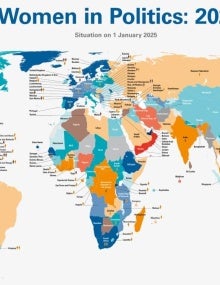Breadcrumb
The “Women in politics: 2025” map, created by the Inter-Parliamentary Union (IPU) and UN Women, presents new data for women in executive positions and national parliaments as of 1 January 2025. More
Resource type
Topic
- Show all (900)
- Shelters (-) (1)
- Peace and security (83)
- Gender equality and women’s empowerment (65)
- Economic empowerment (63)
- Ending violence against women and girls (63)
- Humanitarian action (55)
- Health (39)
- COVID-19 (38)
- Gender equality and inequality (38)
- Leadership and political participation (30)
- Women’s rights (17)
- 2030 Agenda for Sustainable Development (15)
- Crisis response and recovery (15)
- Gender statistics (15)
- Governance and national planning (13)
- Human rights (12)
- Conflict, war (11)
- Peacebuilding (11)
- Sustainable Development Goals (SDGs) (11)
- Youth (11)
- Peace processes (9)
- Beijing Platform for Action (8)
- Climate change (8)
- Women with disabilities (8)
- Anti-violence interventions (7)
- Employment (7)
- Partnerships (7)
- Access to justice and legal protection (6)
- Gender, culture and society (6)
- Gender data production and collection (6)
- Mediation and conflict resolution (6)
- Entrepreneurship (5)
- Gender data gaps (5)
- Health care services (5)
- Living conditions (5)
- Political empowerment (5)
- Sexual and reproductive health and rights (5)
- UN system coordination (5)
- Violent extremism and terrorism (5)
- Access to basic services (4)
- Adolescents (4)
- Civil society (4)
- Civil society participation (4)
- Commission on the Status of Women (4)
- Communications and media (4)
- Education (4)
- Gender data use and accessibility (4)
- Gender discrimination (4)
- Government contributors (4)
- Migration (4)
- Monitoring and evaluation (4)
- Peacekeeping (4)
- Poverty (4)
- Service delivery (4)
- Sex-disaggregated data (4)
- Social protection (4)
- Constitutions and legal reform (3)
- Disaster risk reduction (3)
- Domestic violence/interpersonal violence (3)
- Financial and economic crisis (3)
- Financing for gender equality (3)
- Gender equality indicators (3)
- Gender mainstreaming (3)
- Macroeconomic policies (3)
- Men and boys (masculinity) (3)
- Productive resources (3)
- Unpaid work (3)
- UN Security Council resolution 1325 (3)
- UN Security Council resolutions (3)
- Accountability (2)
- Child marriage (2)
- Citizen engagement (2)
- Decision-making (2)
- Financial resources (2)
- Gender wage gap (2)
- Harmful practices (2)
- Information and communications technology (ICT) (2)
- Intergovernmental processes (2)
- Local development (2)
- National committees (2)
- National mechanisms (2)
- Post-conflict recovery (2)
- Public administration (2)
- Sexuality (2)
- Access to justice post-conflict (1)
- Accountability in the UN system (1)
- Ageing/older people (1)
- Campaigns (1)
- Capacity development (1)
- Care and support services (1)
- Children’s rights (1)
- Electoral systems and processes (1)
- Energy (1)
- Environmental protection (1)
- Feminicide/femicide (1)
- Food security (1)
- Fund for Gender Equality (1)
- Gender-responsive budgeting (1)
- Gender stereotypes (1)
- Governance (1)
- Green economy (1)
- HIV and AIDS (1)
- Inheritance rights (1)
- Innovation and technology (1)
- Land and property (1)
- Laws, legislation (1)
- Legal assistance (1)
- Migrant workers (1)
- National planning (1)
- National statistical systems (1)
- New media (1)
- Parliamentary development (1)
- Planning and monitoring (1)
- Rural development (1)
- Rural women (1)
- Schooling (1)
- Sexual harassment (1)
- Traditional media (1)
- Training (1)
- Trust funds (1)
- United Nations General Assembly (1)
- Women farmers (1)
- Women’s movements (1)
1 - 1 of 1 Results
Date:
This brief explores the implications for the provision of essential services for women and girls who have experienced violence during the COVID-19 pandemic. It provides recommendations for governments, civil society, and international organizations that are seeking to improve the quality of and access to coordinated health, police and justice, and social services for all women and girls during the crisis and provides examples of promising practices to date.
1 - 1 of 1 Results

